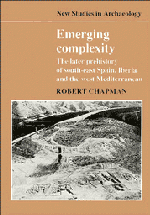Book contents
- Frontmatter
- Contents
- List of figures
- List of tables
- Preface
- 1 Two tribes: questions of theory, scale and explanation
- 2 Hello, goodbye: Iberian prehistory and traditional archaeology
- 3 Another one bites the dust: the implications of the absolute chronology
- 4 Getting better: south-east Spain, the cultural framework 5000–500 bc
- 5 Dancin' in the dark? Adaptation and intensification in south–east Spain
- 6 Centrefield: recent models of intensification and cultural change in south-east Spain
- 7 Into the groove: system scale and technological innovation in south-east Spain
- 8 Out of reach? Complexity, interaction and integration in south-east Spain
- 9 Eliminator: models and the archaeological record in south-east Spain
- 10 Strong persuader: intensification and interaction in Iberia and the west Mediterranean
- 11 With or without you: variability, evaluation and complexity
- Bibliography
- Index
11 - With or without you: variability, evaluation and complexity
Published online by Cambridge University Press: 05 March 2012
- Frontmatter
- Contents
- List of figures
- List of tables
- Preface
- 1 Two tribes: questions of theory, scale and explanation
- 2 Hello, goodbye: Iberian prehistory and traditional archaeology
- 3 Another one bites the dust: the implications of the absolute chronology
- 4 Getting better: south-east Spain, the cultural framework 5000–500 bc
- 5 Dancin' in the dark? Adaptation and intensification in south–east Spain
- 6 Centrefield: recent models of intensification and cultural change in south-east Spain
- 7 Into the groove: system scale and technological innovation in south-east Spain
- 8 Out of reach? Complexity, interaction and integration in south-east Spain
- 9 Eliminator: models and the archaeological record in south-east Spain
- 10 Strong persuader: intensification and interaction in Iberia and the west Mediterranean
- 11 With or without you: variability, evaluation and complexity
- Bibliography
- Index
Summary
By way of a conclusion I want to summarise as succinctly as possible the general points I have been making about archaeology, about prehistoric south-east Spain, and about the study of complexity in the Mediterranean. The details can be found in the earlier chapters. Whether these points are welcomed or criticised by the reader is less important than their expression in a coherent form. Gellner's ‘diversified and uncontrollable community of scientists’ is still out there and waiting.
The four points I wish to make concern my approach to the past, and particularly the emphasis on variability, the meaning given to the archaeological record, the evaluation of models for the emergence of cultural complexity, and lastly the differences between forms and rates of cultural change in the east and west Mediterranean basins. In all cases, my aim is to look to the future of research in Mediterranean prehistory.
Variability
My approach to the past is stated clearly in chapter 1. It is an approach which centres upon the study of cultural evolution, using processual explanation, and which expects to be able to evaluate different ideas about cultural change using the archaeological record. This record is not uniform, but variable, as was behaviour in the past. Processes of change may occur at different rates and at different scales, and, as has often been pointed out, different models may have what we might call their own ‘scale-ranges’.
- Type
- Chapter
- Information
- Emerging ComplexityThe Later Prehistory of South-East Spain, Iberia and the West Mediterranean, pp. 268 - 271Publisher: Cambridge University PressPrint publication year: 1990

